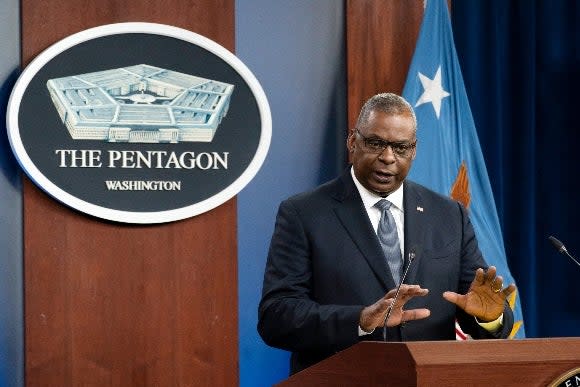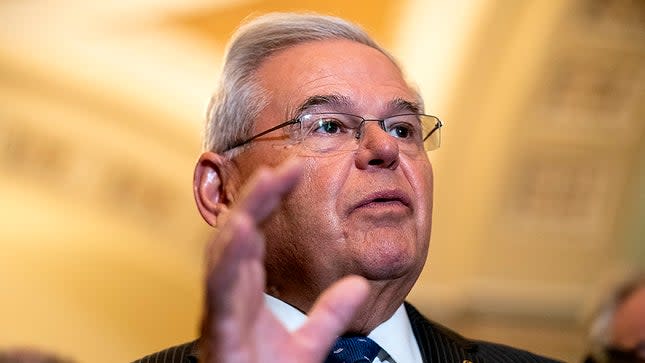Overnight Defense & National Security — Pentagon tells Russia to stand down
- Oops!Something went wrong.Please try again later.
- Oops!Something went wrong.Please try again later.
- Oops!Something went wrong.Please try again later.

It's Friday, welcome to Overnight Defense & National Security, your nightly guide to the latest developments at the Pentagon, on Capitol Hill and beyond. Subscribe here: thehill.com/newsletter-signup.
The Pentagon pressed Russia to stand down on its military posture near Ukraine, with the administration issuing another warning about the threat of a potential invasion.
We'll do a rundown of the latest developments in the conflict, plus the House committee investigating the Jan. 6, 2021 attack on the U.S. Capitol issuing subpoenas to several individuals involved in a scheme to send fake Electoral College certificates.
For The Hill, I'm Jordan Williams. Send me tips at jwilliams@thehill.com.
Let's get to it.
Ball in Putin's court

The Pentagon on Friday called on Russia to stand down on Ukraine as tensions rise over the threat of a Russian military invasion.
Defense Secretary Lloyd Austin in a briefing with reporters said Moscow has for months been deploying forces along Ukraine's border at a "consistent and steady pace," which has been supported by Russian naval activity in the northern Atlantic and Mediterranean Sea.
"We don't believe that President Putin has made a final decision to use these forces against Ukraine," Austin said. "He clearly now has that capability."
No reason for armed conflict: Russia has amassed at least 100,000 troops near the Ukrainian border, and the U.S. has warned in recent weeks that Putin could attack at any moment. President Biden has warned Putin that such an attack would be met with severe economic consequences for Moscow.
The Kremlin has denied any intention of seeking to invade Ukraine, but weeks of diplomatic dialogue aimed at diffusing the conflict has largely proven unsuccessful. As diplomatic talks continue, NATO has moved to bolster its security forces along the eastern flank, as Ukraine shares borders with four alliance members.
Austin and Gen. Mark Milley, chairman of the Joint Chiefs of Staff, stressed that there was no reason for armed conflict.
"It's the policy of the United States government to continue to support an independent Ukraine and their goals. And we are continuing our efforts to enhance their ability to protect themselves," Milley said.
"We strongly encourage Russia to stand down and to pursue a resolution through diplomacy," he continued. "Armed force should always be the last resort. Success here is through dialogue."
SOMETHING TO WATCH
The United States has called for a meeting of the United Nations Security Council to address Russia's behavior and the build-up of Russian troops on Ukraine's border.
A senior administration official on Friday told reporters the U.S. wants to get U.N. members on the record.
"It basically boils down to the question of whether there should be a path of war, or whether there should be a path of diplomacy," the official told reporters in a briefing. "I think the expectation is that members of the Security Council will be weighing in on this question and supportive of a diplomatic approach."
The administration official said that no concrete measures or a joint statement are expected to come out of the council meeting. Russia, as one of five permanent members of the council, holds power to veto such measures in the council. The other permanent members are the U.S., France, the United Kingdom and China.
Ukraine appeals to senators

As lawmakers scramble to iron out a sanctions package against Russia ahead of a potential invasion, the head of Ukraine's parliament sent a letter to several U.S. senators outlining specific demands for what those sanctions should look like.
Ruslan Stefanchuk, chairman of Ukraine's Verkhovna Rada legislature, thanked the senators for supporting Ukraine, and "stressed the importance of already adopted laws to support Ukraine in combating Russian aggression," according to a statement from the parliament.
According to Axios, which first obtained the letter, the request was sent to Senate Foreign Relations Committee Chairman Robert Menendez (D-N.J.) and Sen. James Risch (R-Idaho), the ranking member on the Senate Foreign Relations panel. The letter was also sent to Sens. Rob Portman (R-Ohio), Jeanne Shaheen (D-N.H.), Chris Murphy (D-Conn.), John Cornyn (R-Texas), Lindsey Graham (R-S.C.) and Ben Cardin (D-Md.).
The senators on Monday took part in a meeting over Zoom to try to figure out the details for legislation on sanctioning Russia.
More coverage of the Russia-Ukraine conflict:
UN Security Council meeting to address Russia, Ukraine crisis
Ukraine sent letter to senators seeking specific Russia sanctions, military assistance
Jan. 6 panel goes after fake electors scheme

The House Jan. 6 Select Committee said Friday it is subpoenaing more than two dozen people involved in the scheme following the 2020 election where supporters of former President Trump submitted fake Electoral College certificates claiming he had won in various battleground states that had gone to President Biden.
The panel announced that it had issued subpoenas to 14 individuals from seven states who had filed the fake documents with the National Archives.
The group of people who were subpoenaed appear to all be state GOP officials and activists from Arizona, Georgia, Michigan, New Mexico, Nevada, Pennsylvania and Wisconsin.
What the committee wants to know: In letters sent out Friday, the select committee told the subjects of the subpoenas that it is investigating who was involved in the scheme, citing media reports that the group had met on Dec. 14, 2020 to cast their "votes."
The committee said it is seeking answers about who had overseen the scheme.
"We believe the individuals we have subpoenaed today have information about how these so-called alternate electors met and who was behind that scheme," the committee said in a tweet. "We encourage them to cooperate with the Select Committee's investigation."
In the DOJ's hands: Earlier this week, Deputy Attorney General Lisa Monaco told CNN that federal prosecutors were also examining the "alternate electors" effort.
"We've received those referrals. Our prosecutors are looking at those and I can't say anything more on ongoing investigations," Monaco told the network on Tuesday.
ON TAP FOR MONDAY
President Biden will welcome Qatari Emir Sheikh Tamim Bin Hamad al-Thani
The Royal United Services Institute will host a discussion on "The Strategy of Denial: American Defense in an Age of Great Power Conflict" at 10 a.m.
The Hudson Institute will host a discussion on "Iran Nuclear Negotiations: Will a Revived Deal Undermine American Interests?" at 12 p.m.
WHAT WE'RE READING
Biden seeks to ward off second Ukraine-Russia fight
The Hill Opinion: After years on the sidelines, the US needs an Indo-Pacific economic strategy
The Hill Opinion: The Biden administration faces a dangerous anti-American triad
Defense News" US military readies to 'walk and chew gum' as multiple crises loom
Military.com: Marines make it easier for those kicked out over vaccines to come back
That's it for today! Check out The Hill's defense and national security pages for latest coverage. See you on Monday.

